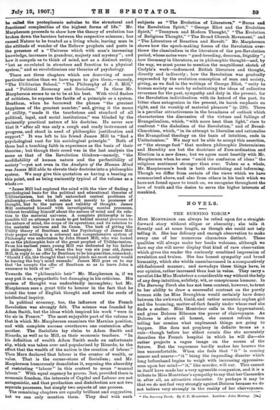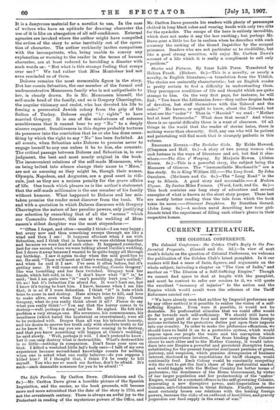NOVELS.
THE BURNING TORCH.•
Miss MONTRESOR can always be relied upon for a straight• forward story without ellipse or obscurity ; she tells it fluently and at some length, as though she could not help telling it. She has delicacy and enough observation to make every one of her numerous characters distinct. These qualities will always make her books welcome, although we dare say she will never display that kind of rare observation which gives the reader the curiously combined impression of revelation and truism. She has honest sympathy and broad humanity, which she wields unembarrassed in a comparatively old-fashioned manner; and nowadays these things have, in our opinion, rather increased than lost in value. They carry a novelist like Miss Montresor a considerable way without the help of any deep intuition, subtlety, wit, or conspicuous humour. In The Burning Torch she has not been content, however, to trust to her ability to draw a successful contrast on the purely human side (as Miss Broughton would certainly have done) between the awkward, timid, and rather eccentric orphan girl and the bouncing, matter-of-fact family under whose roof she finds a shelter. Miss Montresor calls in the hypernatural, and gives Dolores Ellerson the power of clairvoyance. As Dolores is above all honest, she cannot refrain from telling her cousins what unpleasant things are going to happen. She does not prophesy in definite terms as a rule—though before her eldest cousin dies she accurately describes the French hospital in which he will die—she rather projects a vague image on the screen of the future. But the vagueness hardly makes her hearers the less uncomfortable. When she feels that " it " is coming nearer and nearer—" it " being the impending disaster which long beforehand begins to weigh with increasing oppressive- ness upon her mind—" it," like murder, will out. This cannot in itself have made her a very agreeable companion, and it is a tribute to Miss Montresor's sympathy to say that her Cassandra is, after all, an attractive character. Or perhaps it may be that we do not feel very strongly against Dolores because we do not believe very strongly in the reality of her clairvoyance.
• The Burning Torch. By F. F. Montr6sor. London: Jolla Murray. [62.]
It is a dangerous material for a novelist to use. In the case of writers who have an aptitude for drawing character the use of it is like an abnegation of all self-confidence. External agencies are invoked where the author might have compelled the action of the story to arise inevitably out of the opera- tion of character. The author recklessly invites comparison with the incompetents, who, being unable to convey any explanation or warning to the reader in the terms of human character, are at least reduced to heralding a disaster with such words as : "But what is this strange feeling that creeps over me? " We had rather that Miss Montresor had not even reminded us of them.
Dolores remains the most memorable figure in the story. But her cousin Sebastian, the one member of the formal and undemonstrative Muncassen family who is not antipathetic to her, is clearly drawn. So is Mr. Muncassen himself, the self-made head of the family, and so is Gregory Charrington, the angular visionary and zealot, who has devoted his life to freeing a persecuted Jewish colony from the grip of the Sultan of Turkey. Dolores ought " 1,7 rights" to have married Gregory. It is one of the misfortunes of extreme sensitiveness that it cannot bear to say "No" to a deeply sincere request. Sensitiveness in this degree probably tortures its possessor into the conviction that he or she has done some- thing by which the right to say "No" has been forfeited. At all events, when Sebastian asks Dolores to promise never to engage herself to any one unless it be to him, she consents. The critical passage between Dolores and Sebastian is, in our judgment, the best and most nearly original in the book. The inconvenient relations of the self-made Muncassen, who on being bribed into silence change their name to " Mum," are not as amusing as they might be, though their names, Olympia, Napoleon, and Augustus, are a good asset in ridi- cule, just as they are a serious penalty for the grave affairs of life. One touch which pleases us is the author's statement that the self-made millionaire is the one member of his family without humour. What happened to Dolores and her mis- taken promise the reader must discover from the book. We end with a quotation in which Dolores discusses with Gregory Charrington the nature of her peculiar powers, only justifying our selection by remarking that of all the " scenes" which our Cassandra foresaw, this one at the wedding of Mun- cassen's eldest daughter was the most stupendous:-
"' Often I forget, and often—usually I think—I am very happy; but every now and then something sweeps through me like a wind and then I see ! It happens oftenest when I am with Sebastian, and I think that is because we wore children together and because we were fond of each other. It happened yesterday, just for one second, when we were talking about Cecilia's wedding, but I drove it away because I wanted to be quite happy all through my birthday. I saw it again to-day when See said good-bye to me. He said, "Then we'll meet at Cissie's wedding, that's settled," and when he said it I saw. I've seen it often before, but it's getting near. It will come out at the wedding, Cousin Gregory.' She was trembling and her face twitched. Gregory took her hands, which felt cold, in his. ' I don't know what " it " is,' he said; but I am quite sure "it" can't possibly hurt you.'—' Me! Oh no ! but it's Sebastian I'm afraid for. It won't hurt me, but I know it's trying to hurt him. I know, because when I see like that, it is as if I were Sebastian. I think "it" is hate which tries to come in and destroy. Hate always tries to kill, and love to make alive, oven when they are both quite tiny. Cousin Gregory, what do you really think about it all ? Please do say what you really think.'—' You say that the horror comes in to destroy—well, perhaps it does,' said he. He sighed. He felt this problem a very strange one. His reverence, his commonsense, his manliness (which hated the hysterical or overstrained), were all to be reckoned with. Deeper than all was his inherent honesty, and his desire to answer her truth only with absolute truth so far as he knew it. ' You say you see a horror coming in to destroy, and that you know something will happen at Cissie's wedding,' he said slowly. ' Well, perhaps it will. I don't pretend to know ; but it can only destroy what is destructible. What's destructible is so little—nothing in comparison. Don't focus your eyes on that. I killed a wretched little lad's body once—I talk of my own experience because second-hand knowledge counts for nothing when one is asked what one really believes—do you suppose I killed him ? If I thought that, I think I'd be ready to kill myself. You who see so much see farther, don't be afraid. It's such—such damnable nonsense for you to be afraid! '"







































 Previous page
Previous page